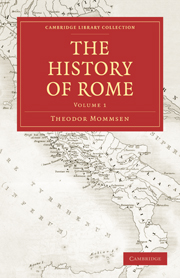Book contents
- Frontmatter
- PREFACE
- PREFATORY NOTE BY THE TRANSLATOR
- EXTRACT FROM DR. MOMMSEN'S PREFACE
- Contents
- BOOK FIRST THE PERIOD ANTERIOR TO THE ABOLITION OF THE MONARCHY
- CHAPTER I INTRODUCTION
- CHAPTER II THE EARLIEST MIGRATIONS INTO ITALY
- CHAPTER III THE SETTLEMENTS OF THE LATINS
- CHAPTER IV THE BEGINNINGS OF ROME
- CHAPTER V THE ORIGINAL CONSTITUTION OF ROME
- CHAPTER VI THE NON-BURGESSES AND THE REFORMED CONSTITUTION
- CHAPTER VII THE HEGEMONY OF ROME IN LATIUM
- CHAPTER VIII THE UMBRO-SABELLIAN STOCK—BEGINNINGS OF THE SAMNITES
- CHAPTER IX THE ETRUSCANS
- CHAPTER X THE HELLENES IN ITALY.—MARITIME SUPREMACY OF THE TUSCANS AND CARTHAGINIANS
- CHAPTER XI LAW AND JUSTICE
- CHAPTER XII RELIGION
- CHAPTER XIII AGRICULTURE, TRADE, AND COMMERCE
- CHAPTER XIV MEASURING AND WRITING
- CHAPTER XV ART
- BOOK SECOND FROM THE ABOLITION OF THE MONARCHY IN ROME TO THE UNION OF ITALY
- APPENDIX: ON THE PATRICIAN CLAUDII
- ADDITIONS AND CORRECTIONS
CHAPTER XV - ART
Published online by Cambridge University Press: 05 October 2010
- Frontmatter
- PREFACE
- PREFATORY NOTE BY THE TRANSLATOR
- EXTRACT FROM DR. MOMMSEN'S PREFACE
- Contents
- BOOK FIRST THE PERIOD ANTERIOR TO THE ABOLITION OF THE MONARCHY
- CHAPTER I INTRODUCTION
- CHAPTER II THE EARLIEST MIGRATIONS INTO ITALY
- CHAPTER III THE SETTLEMENTS OF THE LATINS
- CHAPTER IV THE BEGINNINGS OF ROME
- CHAPTER V THE ORIGINAL CONSTITUTION OF ROME
- CHAPTER VI THE NON-BURGESSES AND THE REFORMED CONSTITUTION
- CHAPTER VII THE HEGEMONY OF ROME IN LATIUM
- CHAPTER VIII THE UMBRO-SABELLIAN STOCK—BEGINNINGS OF THE SAMNITES
- CHAPTER IX THE ETRUSCANS
- CHAPTER X THE HELLENES IN ITALY.—MARITIME SUPREMACY OF THE TUSCANS AND CARTHAGINIANS
- CHAPTER XI LAW AND JUSTICE
- CHAPTER XII RELIGION
- CHAPTER XIII AGRICULTURE, TRADE, AND COMMERCE
- CHAPTER XIV MEASURING AND WRITING
- CHAPTER XV ART
- BOOK SECOND FROM THE ABOLITION OF THE MONARCHY IN ROME TO THE UNION OF ITALY
- APPENDIX: ON THE PATRICIAN CLAUDII
- ADDITIONS AND CORRECTIONS
Summary
Artistic endowments of the Italians.
Poetry is impassioned language, and its modulation is melody. While in this sense no people is without poetry of the and music some nations have received a preeminent endowment of poetic gifts. The Italian nation, however, was not and is not one of these. The Italian is deficient in the passion of the heart, and in the longing to idealize what is human and to give life to the things of the inanimate world, which form the very essence of poetic art. His acuteness of perception and his charming versatility enabled, him to excel in irony and in the vein of tale-telling such as we find in Horace and Boccaccio, in the graceful pleasantries of love and song which are presented in Catullus and in the best popular songs of Naples, above all in low comedy and in farce. Italian soil gave birth in ancient times to burlesque tragedy, and in modern times to burlesques of the poetry of chivalry. In rhetoric and theatrical art especially no other nation equalled or equals the Italians. But in the more perfect kinds of art they have hardly advanced beyond cleverness of execution, and no epoch of their literature has produced a true epos or a genuine drama. The very highest literary works that have been successfully produced in Italy, divine poems like Dante's Commedia, and historical treatises such as those of Sallust and Macchiavelli, of Tacitus and Colletta, are pervaded by a passion more rhetorical than spontaneous. Even in music, both in ancient and modern times, real creative talent has been far less conspicuous than the facility, which speedily assumes the character of virtuosoship, and enthrones in the room of genuine and genial art a hollow and heart-withering idol.
- Type
- Chapter
- Information
- The History of Rome , pp. 228 - 250Publisher: Cambridge University PressPrint publication year: 2010First published in: 1862



